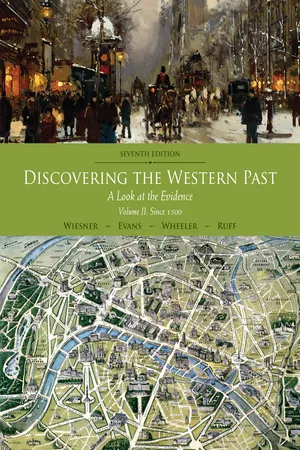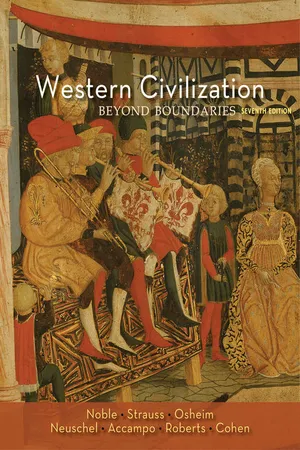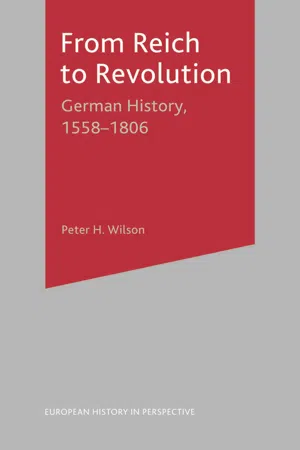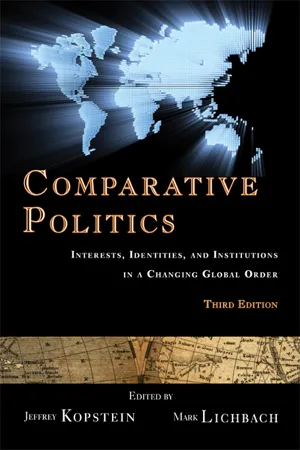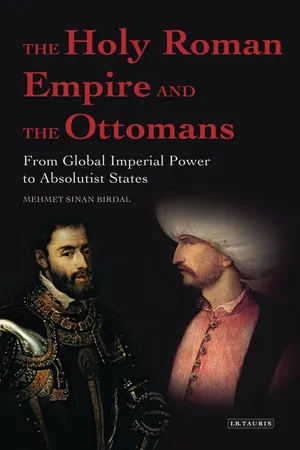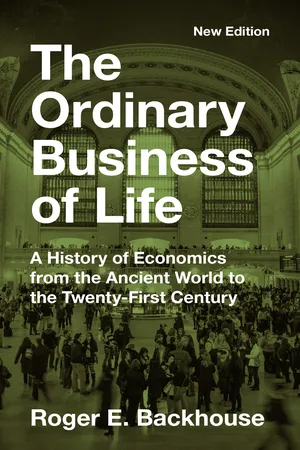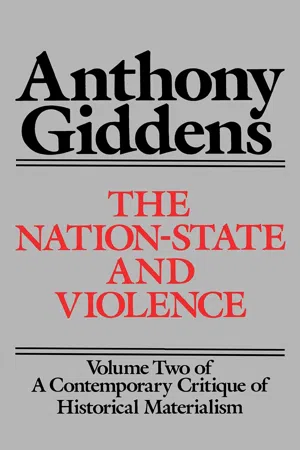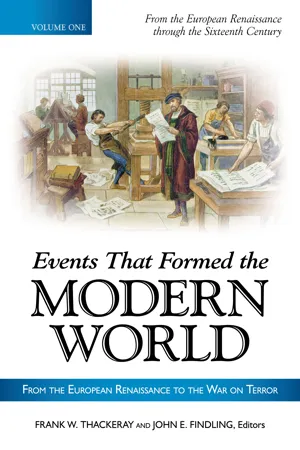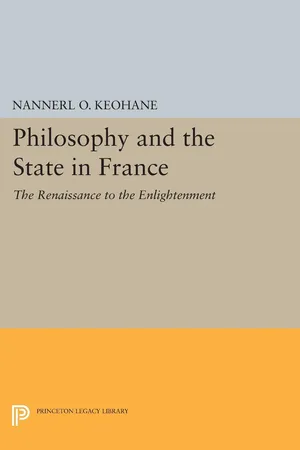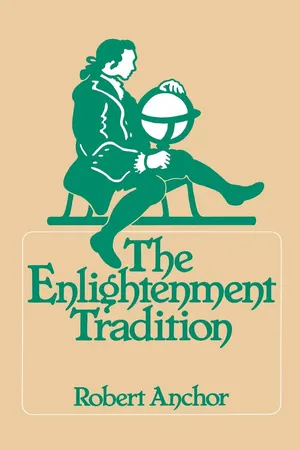History
Absolutist France
Absolutist France refers to the period of centralized royal power under French monarchs, particularly Louis XIV, during the 17th and 18th centuries. This system emphasized the king's absolute authority over all aspects of government and society, often characterized by the divine right of kings and the suppression of dissent. Absolutist France was marked by lavish court culture, territorial expansion, and the promotion of French arts and culture.
Written by Perlego with AI-assistance
Related key terms
1 of 5
12 Key excerpts on "Absolutist France"
- eBook - PDF
Discovering the Western Past
A Look at the Evidence, Volume II: Since 1500
- Merry E. Wiesner-Hanks, Andrew Evans, William Bruce Wheeler, Julius Ruff(Authors)
- 2014(Publication Date)
- Cengage Learning EMEA(Publisher)
Rulers in Prussia, Austria, Russia, and many smaller states sought not only the real power of the French kings, but also the elaborate court ceremony and dazzling palaces that symbolized that power. Absolutism in France was the work of Henry IV (r. 1589–1610), Copyright 201 Cengage Learning. All Rights Reserved. May not be copied, scanned, or duplicated, in whole or in part. Due to electronic rights, some third party content may be suppressed from the eBook and/or eChapter(s). Editorial review has deemed that any suppressed content does not materially affect the overall learning experience. Cengage Learning reserves the right to remove additional content at any time if subsequent rights restrictions require it. [50] Chapter 3 Staging Absolutism Louis XIII (r. 1610–1643) and his minister Cardinal Richelieu, and Louis XIV (r. 1643–1715). These rulers established a system of centralized royal political authority that de-stroyed many remnants of the feudal monarchy. The reward for their en-deavors was great: With Europe’s larg-est population and immense wealth, France was potentially the mighti-est country on the Continent in 1600 and its natural leader, if only these national strengths could be unified and directed by a strong government. Just as importantly, these monarchs endeavored to create strong central governments as proof against internal disorders, like rebellion and civil war-fare, that plagued the medieval state. But French rulers confronted formida-ble problems, common to many early modern states, in achieving their goals. Nobles everywhere still held consider-able power, in part a legacy of the sys-tem of feudal monarchy. In France, they possessed military power, which they used in the religious civil wars of the sixteenth century and in their Fronde revolt against growing royal power in the mid-seventeenth century. - eBook - PDF
Comparative Politics
Interests, Identities, and Institutions in a Changing Global Order
- Jeffrey Kopstein, Mark Lichbach, Stephen E. Hanson(Authors)
- 2014(Publication Date)
- Cambridge University Press(Publisher)
Whereas in insular England the aristocracy prevented the monarchy from establishing an army and seizing control of the goverment of local daily affairs, on the continent the more constant, immediate threat of war and invasion favored territorial rulers in their bids to raise armies and to monopolize the control of social resources. In fits and starts, this pro-cess gave rise to a new political order called absolutism , with suzerains, the nominal hold-ers of ultimate authority over a given territory in the feudal order, becoming sovereigns, the effective final arbiters of authority within their lands. The absolutist monarchs of continen-tal Western Europe did not, of course, exercise absolute authority; they lacked the technical means of modern dictatorships, for example. What was absolute – and novel – about their rule was their claim potentially to control all aspects of life within their realms. Historians generally tend to describe Ferdinand and Isabella of Spain as the first absolute monarchs, but France usually occupies the rank of the prototypical absolute monarchy, attaining its highpoint under the long reign of Louis XIV (1642 – 1710), the roi soleil whose memorable “L’État, c’est moi” embodied the absolutist principle. Absolutism and the Origins of Contemporary French Institutions, Interests, and Identity Two centuries, however, separated Charles VII’s establishment of a standing royal army from Louis XIV’s glorious reign – two centuries that laid the foundations for the institutions, interests, and identities of contemporary France. With the close of the Hundred Years War, France 83 the French monarchy consolidated its rule, notably under Louis XI, whose reign ushered in the French Renaissance, characterized by the construction of the celebrated chateaux along the Loire River and the incorporation into court life of geniuses the likes of Leonardo da Vinci. The French kings did not yet rule unilaterally, though. - eBook - PDF
Western Civilization
Beyond Boundaries
- Thomas F. X. Noble, Barry Strauss, Duane Osheim, Kristen Neuschel(Authors)
- 2013(Publication Date)
- Cengage Learning EMEA(Publisher)
Cengage Learning reserves the right to remove additional content at any time if subsequent rights restrictions require it. France in the Age of Absolutism 457 declared many Jansenist doctrines to be heretical as part of a compromise agreement with Louis on matters of church governance and finance. Despite these successes, the power of the Crown was still greatly limited by modern standards. The “divine right” of kingship, a notion formulated by Louis’s chief apologist, Bishop Jacques Bossuet (BOS-soo-way) (1627–1704), did not mean unlimited power to rule; rather, it meant that hereditary monarchy was the divinely ordained form of government, best suited to human needs. Absolutism was not iron-fisted control of the realm, but rather the successful focusing of energy, loyalties, and symbolic authority in the Crown. The gov- ernment functioned well in the opening decades of Louis’s reign because his role as the focal point of power and loyalty was both logical, after the preceding years of unrest, and skillfully exploited. Much of the glue holding together the absolutist state lay in informal mechanisms, such as patronage and court life, as well as in the traditional hunt for military glory—all of which Louis amply supplied. The Life of the Court An observer comparing the lives of prominent noble families in the mid-sixteenth and mid- seventeenth centuries would have noticed striking differences. By the second half of the sev- enteenth century, most sovereigns or territorial princes had the power to crush revolts. The nobility relinquished its former independence but retained economic and social supremacy and, as a consequence, considerable political clout. Nobles also developed new ways to sym- bolize their privilege by means of cultural refinement. This process was particularly dramatic in France. One sign of Louis’s success in marshaling the loyalty of the aristocracy was the brilliant court life that his regime sustained. - eBook - PDF
From Reich to Revolution
German History, 1558-1806
- Peter H. Wilson(Author)
- 2019(Publication Date)
- Red Globe Press(Publisher)
Chapter 6: Territorial Absolutism 6.1 The Rise of Absolutism Absolutism ^ a myth? The term ‘absolutism’ dates from the liberal critique of monarchy after the Napoleonic Wars. It was later adopted by historians and political scientists to distinguish authoritarian royal rule from both constitutional monarchy and liberal republicanism. It is usually de¢ned as unrestrained royal power, legitimised by divine and hereditary rights, and exercised through a centralised bureaucracy and permanent army. This form of government was rejected in Britain during the Civil War and later Glor-ious Revolution of 1688, as well as by the Dutch in their revolt against Spain. France is usually identi¢ed as the leading absolute monarchy, symbolised by the reign of Louis XIV (r.1643^1715), who is supposed to have served as a model for its introduction elsewhere. Absolutism is thought to have developed in central Europe as a result of the Thirty Years War and is epitomised here by Frederick William, the Great Elec-tor of Brandenburg (r.1640^88), who crushed his Estates and reduced the Junkers to a ‘service nobility’ sta⁄ng his army and bureaucracy. These developments had far-reaching consequences, leading many his-torians to label the entire period 1648^1789 as the ‘age of absolutism’. Further research from the 1960s cast doubt on this interpretation, by identifying limits to supposedly absolute royal power. The Estates and other traditional institutions were not swept away. The new bureaucra-cies were corrupt and ine⁄cient, and had limited reach into the localities. Reforms were piecemeal and often counter-productive. This critique broadened after 1992 to dismiss absolutism entirely, as a ‘myth’ fabri-cated by nineteenth-century political rhetoric and historians who were 208 dazzled by the facŶ ade of royal power. All monarchies remained variants of ‘consultative monarchy’, ruling by placating key interest groups such as the aristocracy. - eBook - PDF
Comparative Politics
Interests, Identities, and Institutions in a Changing Global Order
- Jeffrey Kopstein, Mark Lichbach(Authors)
- 2008(Publication Date)
- Cambridge University Press(Publisher)
Since the laws and obligations they rendered more effective were those that main- tained the feudal order and the interests of the dominant class, the aristocracy hardly contested this aggrandizement of monarchical power. Yet as with the FRANCE 91 concession of a permanent royal army, the feudal nobility would learn to regret the convenience of an effective crown. Whereas in insular England the aristocracy prevented the monarchy from establishing an army and seizing control of the governance of local, daily affairs, on the continent the more constant, immediate threat of war and invasion favored territorial rulers in their bids to raise armies and to monop- olize the control of social resources. In fits and starts, this process gave rise to a new political order called absolutism, with suzerains, the nominal hold- ers of ultimate authority over a given territory in the feudal order, becoming sovereigns, the effective final arbiters of authority within their lands. The abso- lutist monarchs of continental Western Europe did not, of course, exercise absolute authority; they lacked the technical means of modern dictatorships, for example. What was absolute – and novel – about their rule was their claim potentially to control all aspects of life within their realms. Historians gen- erally tend to describe Ferdinand and Isabella of Spain as the first absolute monarchs, but France usually occupies the rank of the prototypical abso- lute monarchy, attaining its high point under the long reign of Louis XIV (1642–1710), the roi soleil, whose memorable “L’ ´ Etat, c’est moi” embodied the absolutist principle. Absolutism and the Origins of Contemporary French Institutions, Interests, and Identity Two centuries, however, separated Charles VII’s establishment of a standing royal army from Louis XIV’s glorious reign, two centuries that laid the foun- dations for the institutions, interests, and identities of contemporary France. - eBook - PDF
The Holy Roman Empire and the Ottomans
From Global Imperial Power to Absolutist States
- Mehmet Sinan Birdal(Author)
- 2011(Publication Date)
- I.B. Tauris(Publisher)
The literature on the origins of the absolutist state reveals the extent of social and political transformations that yielded the early modern state and the state system. As the review here demonstrates, the absolutist state marked an unprecedented level of centralization of political authority which manifested itself in three main domains: administration, taxation and foreign policy. In all these domains the state managed to achieve and sustain a stable coordination of the ruling class. This political and social coordination was the foundation for the emergence of the early modern state as a unitary actor in world politics. Thenceforth, the state would claim exclusive authority in domestic as well as foreign policy. According to Perry Anderson, the absolutist state was a precursor of the modern state. In the sixteenth century, the centralized monarchies in France, England and Spain broke with the pyramidal, parcellized sovereignty of medieval social formations, with their estates and liege-systems. 35 Absolutism was a reaction of the feudal aristocracy to commercialization; the transformation of the serf into a wage laborer could be prevented by the displacement of politico-legal coercion upwards to a centralized state. With the help of Roman law, the sovereignty of the state was established in more absolute terms and the fief system was turned into an allodial regime – an absolute, inalienable property regime. While transforming feudal ownership into private property, the absolutist state also used the sale of offices as a means of centralization and control over the tax-exempt aristocracy. 36 The emergence of the absolutist state also transformed the state system. Since the absolutist state was still aristocratic in character, the calling of aristocrats, i.e. war-making, remained the political rationale of the absolutist state. The absolutist ideology, mercantilism, was based on a zero-sum model of international politics. - eBook - ePub
The Ordinary Business of Life
A History of Economics from the Ancient World to the Twenty-First Century - New Edition
- Roger E. Backhouse(Author)
- 2023(Publication Date)
- Princeton University Press(Publisher)
5 Absolutism and Enlightenment in Eighteenth-century France PROBLEMS OF THE ABSOLUTE STATE The conditions that led to the proliferation of writing on economic questions in seventeenth-century England had no parallel in France. Many more feudal institutions remained than in England (although some feudal obligations had effectively become marketable commodities), and the king possessed absolute power. Throughout the seventeenth and eighteenth centuries it was frequently dangerous to express opinions that the state might view as subversive. Of the writers discussed in this chapter, Boisguilbert suffered exile and Mirabeau imprisonment for their economic opinions. In private, however, radical opinions were expressed even in salons patronized by the royal family. Political and social criticism could also be left implicit by formulating it as general principles or by directing it against practices found in other countries. Thus, while French writing on economic questions was sparse during the seventeenth century, it grew substantially during the eighteenth, and by the 1750s and 1760s Paris had become the centre of European economic thinking, to which most of the leading figures came. The structure of French government policy was laid down in the seventeenth century by Jean Baptiste Colbert (1619–83), finance minister under Louis XIV (r.1643–1715) from 1661. He is important because of the policies for which he was responsible. His primary aim was not to raise the living standards of the population but to increase the power of the king. Internally, he wanted to unify the country, economically as well as politically, so that, for example, famine in one region could not coexist with plenty in another. Externally, his belief was that the volume of world trade was fixed, meaning that one country’s gain had to be matched by a corresponding loss elsewhere - eBook - ePub
- Anthony Giddens(Author)
- 2013(Publication Date)
- Polity(Publisher)
27 Rather, it is most accurately seen as expressing the perpetuation of the class domination of a traditional, land-owning minority, which became substantially transformed largely as an unintended consequence of attempts to cope with threats internally and externally. The external processes involved in the development of a novel state system are in my opinion much more important than many historians have been given to suppose. Internally, the most significant factors were probably, as Anderson suggests, attempts on the part of ruling authorities to cope with changes leading to the partial dissolution of the autonomy of localized peasant communities. The outcome was a ‘displacement of authority upwards’, considerably strengthening the centralized apparatus of royal power. Almost certainly the presence of the partially autonomous urban communes was of major importance (together with other distinctively ‘European’ or ‘Western’ influences) in preventing the post-feudal state from crushing the peasantry in time-honoured fashion. A quite distinctive political order was thereby created.The effects of absolutism in strengthening the bureaucratic rule of a territorially bordered state should not be exaggerated. Marx’s statement notwithstanding, it is only with the emergence of the nation-state that a centralized administrative apparatus of state power becomes ‘ubiquitous’. If it can justifiably be regarded as the highest development of the absolutist state, France under Louis XIV was still fairly remote from the nation-state form. It was in some respects possibly the most homogeneous country in Europe. Most of the inhabitants spoke the same language, although the differences between the dialects used in various provinces were extreme by later standards. But in some key ways the scope of the state apparatus remained quite limited. Even the monarch was not simply the King of France; in the South he was referred to, and called himself, the Comte de Provence, while in Dauphiné he was the Dauphin de Viennois. If the self-enclosed character of the local peasant community had been substantially undermined, the regions retained a great deal of administrative control over their own affairs. Both in respect of legal and of fiscal administration there were large regional variations and overlapping criteria of application. Voltaire observed that ‘what is just or right in Champagne should not be deemed unjust or wrong in Normandy.’28 But such remained the case to the end of Louis XIV’s reign. While Roman law predominated in southern courts, in other provincial areas customary law still prevailed. Moreover, sometimes a single community could be subject to multiple types of legal system. For instance, in the Beauvaisis there were some villages within which customary law varied according to several differentiations.29 In spite of the accomplishments of Colbert and other ministers in regularizing the tax system, methods of tax-collection remained capricious. The primary form of direct taxation, the taille, was collected by officials responsible to the central state. Other taxes were farmed, and the Pays d’États had their own procedures of tax-gathering. Moreover, there were two kinds of taille, one levied chiefly on land, and applied mainly in the south, the other a form of personal taxation. Many categories of persons were exempt from the taille, - eBook - ePub
Events That Formed the Modern World
From the European Renaissance through the War on Terror [5 volumes]
- Frank W. Thackeray, John E. Findling, Frank W. Thackeray, John E. Findling(Authors)
- 2012(Publication Date)
- ABC-CLIO(Publisher)
7 Louis XIV and the Grand Monarchy, 1643–1715
Introduction
The story is told that when King Louis XIII of France lay fatally ill in 1643, his aides brought his young son Louis to his bedside. The dying monarch asked his son to identify himself, and the four-year-old child boldly announced that he was Louis XIV. Although the story is most certainly apocryphal, it does provide an important clue about the man who would be Europe’s most important figure for more than half a century. From an early age, Louis was keenly aware of his importance, and he devoted the bulk of his reign to enhancing his majesty. This objective was not as frivolous as it might seem at first glance, for Louis was the quintessential product of the Age of Absolutism.Thanks to a combination of economic, administrative, and technological advancements, from the late Middle Ages onward Europe’s monarchs had steadily gained ground against their rivals, the nobility. The monarchs also benefited from the sixteenth-century Reformation that not only destroyed Christian unity in western and central Europe but also diminished the Church as a serious threat to royal authority. As monarchs concentrated more and more power in their hands, it became necessary to explain and to justify their ascendancy. The theory of divine right monarchy, or absolutism, provided an explanation.According to divine right theory, God is the source of the monarch’s power. God in His infinite wisdom (a wisdom that no mere mortal can hope to comprehend) has selected the eldest legitimate male in the ruling house to act in political matters as His agent on earth. Because the monarch has been selected by God and is obviously charged with doing God’s will, he cannot be restrained in his legal authority by any mortal man, any collection of mortal men such as a parliament, or any document or institution created by mortal men such as a constitution. Under divine right theory, to challenge the monarch is tantamount to challenging God Himself. This is not to say that the monarch is free to act in an arbitrary and capricious manner, as twentieth-century dictators did. Rather, his actions must be good and just, reflecting the nature of God Himself. Nevertheless, Bishop Jacques Bossuet, a leading advocate of absolutism in Louis XIV’s France, considered royal authority in its proper sphere as a manifestation of God’s will and wrote that “royal power is absolute…. [T]he prince need render account of his acts to no one.” - eBook - PDF
Philosophy and the State in France
The Renaissance to the Enlightenment
- Nannerl O. Keohane(Author)
- 2017(Publication Date)
- Princeton University Press(Publisher)
The Sun King's reign, which had dawned amidst universal expectations of excellent results from benev- olent and conscientious absolutism, ended amidst an equally universal conviction that the salvation of the nation must be the work of many and not of one alone, and that the French monarchy had to be reor- ganized in fundamental ways. 5. BOISGUILBERT AND LAISSEZ-FAIRE In the last two decades of Louis XIVs reign, from 1695 until 1715, while Boulainvilliers was attacking the excessive concentration of power in the hands of the prince himself, several other Frenchmen were disturbed by another kind of concentration of power in the regime: overextended control of areas of life that would be better left alone. The advocates of the these nobiliaire believed that too few Frenchmen, and generally the wrong ones, had a hand in government. They wanted political activity dispersed to other groups and persons in the state. Those who wrote in favor of laissez-faire policies proposed avoiding political activity altogether in certain spheres. Instead of con- structing a countervailing power, these men advised leaving ordinary subjects alone to do things for themselves, to an extent that absolutist politics had never thought possible. Thus both sets of writers, for all their protestations of loyalty to the crown, were anti-absolutist in their intentions and their influences; and both contributed arguments for more participation in French society, despite the differences in tone and substance of their writings. Many merchants in the last decades of Louis XIV's reign became convinced that government attempts to help them by regulating their activities were a crippling constraint. In a number of memoires and petitions, they called for more freedom of action, less interference and control. 42 Among the spokesmen for laissez-faire principles against the 42 Rothkrug, Opposition to Louis XIV, pp. 351-357, quotes from an anonymous - eBook - PDF
- Robert Anchor(Author)
- 2023(Publication Date)
- University of California Press(Publisher)
ABSOLUTE MONARCHY AND CLASS CONFLICT IN THE EIGHTEENTH CENTURY "This has been a century of vile bourgeoisie," noted the Due de Saint-Simon (1675-1755) in 1715, the year in which Louis XIV died. A gossip, a crank, but a sharp observer and critic of court life in the closing decades of the Sun King's reign, Saint-Simon was an embittered wit- ness to the systematic exclusion of his class from the political life of France and its reduction to a parasitic, sycophantic existence at Versailles. He was quite right to see the degradation of the nobility as part of Louis' policy of shifting political responsibility to bourgeois ministers, like Colbert and Louvois, and of enabling bourgeois to enter into political life through the practice of venality (the sale of public oifices). Pressed by the need to finance the con- 13 14 T H E E N L I G H T E N M E N T T R A D I T I O N tinual warfare and extravagance that marked the final de- cades of his reign, Louis also was motivated to adopt this policy by the memory of the Fronde (1648-1652), when bourgeois and aristocrats momentarily joined forces against the crown. Determined that such a collaboration should never recur, Louis always took care to set the one class against the other and, by preserving an equilibrium be- tween them, to hold decisive power in his own hands. The wisdom of this policy lay in the fact that for the time being it prevented from happening in France what had recently happened in England: namely, the overthrow of royal ab- solutism and the creation of a social and political order in which, as the observer, Rabaud Saint-Etienne, expressed it, "nation and king would be nothing, the aristocrats would be everything." This policy had its Achilles heel, however. Whereas the English aristocracy had sacrificed some of its privileges in order to maintain and augment its power, Louis, in depriving the French nobility of its power, ap- peased them by allowing them to retain their privileges. - eBook - ePub
Corps and Clienteles
Public Finance and Political Change in France, 1688-1715
- Mark Potter(Author)
- 2019(Publication Date)
- Routledge(Publisher)
55 These political changes did not merely reflect the improved financial conditions brought about by Colbert’s effective management of revenues. Even with the outbreak of war in 1689, Louis XIV avoided a frontal assault on property and privilege similar to that conducted by Richelieu and Mazarin. The long-term result of Louis’ strategies, as the following chapters demonstrate, was an increased dependence on privileged corps for their financial services and a deeper entrenchment of privilege on the French political landscape. These arrangements, then, would have their own set of costs and consequences that conditioned the choices available to Louis’ successors in the eighteenth century.The period 1689 to 1715 thus formed a pivotal stage in the development of absolutism. In examining this period, this study will tie the choices available to Louis XIV with the structures and institutions that he inherited from his predecessors, while setting his approach apart from that of Richelieu and Mazarin. In doing so, this book argues that absolutism under Louis XIV was neither ossified nor in crisis, but rather dynamic and flexible, and that the participation of privileged corps as financial intermediaries made possible the accommodation between heightened royal needs and continued protection of elite interests.The Early Modern EliteBefore examining how the relationship between the crown and the kingdom’s elite evolved over this period, it is first necessary to identify this group in the early modern context. By its very nature, though, the old-regime elite is not easily identifiable as a coherent social group. While some core values and attitudes and some common interests were shared by much of the elite, lines of division and competition produced at the same time a striking heterogeneity.56Whereas a variety of attributes served to determine elite status, for our purposes it is useful to define the elite simply as the politically powerful. The elite enjoyed a standing that conferred either a degree of political participation on a kingdom-wide level or power and status on the local level. Such power and status could derive from an array of factors including wealth, profession, patron-client ties, titled status and dignity. Symbols and lifestyle, the outward displays of noble status, were at least as important to maintaining one’s position within the elite as were such material considerations as inheritances and financial solvency. Not all nobles and not all officials, however, held a meaningful degree of influence over matters of state finance and politics. In order to concentrate on those who did, this study limits its focus mainly to those members of the elite whose presence in privileged corps (estates, judicial courts, town councils, etc.) or whose activity handling public funds, placed them in positions of frequent financial negotiation with the crown.
Index pages curate the most relevant extracts from our library of academic textbooks. They’ve been created using an in-house natural language model (NLM), each adding context and meaning to key research topics.
